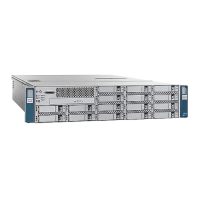3-21
Cisco UCS C210 Server Installation and Service Guide
OL-20887-02
Chapter
Installing DIMMs
This section includes the following sections:
• Memory Performance Guidelines and Population Rules, page 3-21
• DIMM Installation Procedure, page 3-24
Note To ensure the best server performance, it is important that you are familiar with memory performance
guidelines and population rules before you install or replace memory modules.
Memory Performance Guidelines and Population Rules
This section describes the type of memory that the server requires and its effect on performance. The
following topics are covered:
• Supported DIMMs, page 3-21
• Banks and Channels, page 3-21
• Memory Population Rules, page 3-23
• Memory Mirroring and RAS, page 3-24
Supported DIMMs
The qualified and supported part numbers for this component are subject to change over time. For the most
up-to-date list of replaceable components, see the following URL and then scroll to Technical Specifications:
http://www.cisco.com/en/US/products/ps10493/products_data_sheets_list.html
Note Non-ECC UDIMMs do not support temperature sensors.
Banks and Channels
Each Channel is identified by a letter—A, B, C for one CPU, and D, E, F for the other CPU. Each bank
is identified by a numbers, either 1 or 2. For example DIMM slots A1, B1, and C1 belong to Bank–1,
while A2, B2, C2 belong to Bank–2. Note that each slot within Bank 1 is blue, while each slot within
Bank 2 is black.
Figure 3-11 shows how banks and channels are physically laid out on the motherboard. The DIMM slots
on the right (channels A, B, and C) are associated with CPU1, while the DIMM slots on the left (channels
D, E, and F) are associated with CPU2.

